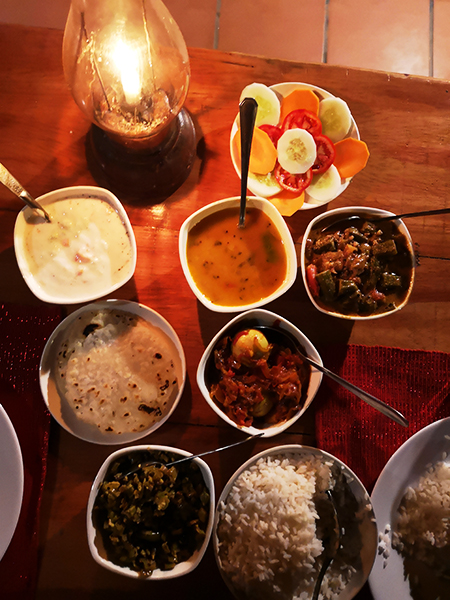AYURVEDA
Ancient Indian medicineHistory and origins
Ayurveda is a precious, ancestral, human and natural discipline that originated over 5,000 years ago in ancient India.
Ayurveda is a Sanskrit word (the sacred language of ancient India) meaning the knowledge of life (AYUR = life or vital force and VEDA = knowledge).
Ayurveda is derived from the sacred texts known as the Vedas (the foundation of Indian culture).
One of the texts, the Charaka Samhita, is a remarkable document on internal medicine explaining how the body is made up of cells.
Ayurveda have been revealed to the visionary sages who were the RISHIS, through intensive meditation techniques.
A science of healing, a philosophy, a wisdom, a way of life, a system of care, a holistic therapeutic method, and also healthy and serene rules for living. Ayurveda is all these things.
Ayurveda’s main mission is to prevent disorders and illnesses from arising in the first place, and if they do, to cure the patient by restoring him or her to health in the original sense: being healthy means being whole.
Taught in India as a modern medicine.
For over five thousand years, India has prevented and cured its ills using its own medicine, Ayurveda
Ancestral science, philosophy, way of life, health method, sacred medicine … Ayurveda is all of these things.
Ayurvea takes into account the totality of the human being in his or her environment.
It is a system of treatment designed to link the individual to his or her body, the body to his or her thoughts, the mind to his or her consciousness and the whole to nature.

According to the principles of Ayurveda, good health depends on lifestyle choices and activities, food, sexuality, emotional management, adaptability, communication and appreciation of the environment.

YOGA AND AYURVEDA
Body and mind balanceMeditation and yoga play an important role in Ayurveda
Ayurveda ‘speaks’ the same language as yoga. It is always a question of general behaviour adapted to the circumstances.
Any excess that produces an imbalance can lead to discomfort, disharmony, dysfunction or disease.
Ayurvedic diagnosis goes right to the root of the problem to find the cause. It takes into account the whole person to establish a diagnosis. In addition to the body, this sacred medicine treats the mind, the conscience and the soul.
Remaining attentive to a correct, stable and therefore balanced position means putting into practice the ‘asanas’ (= yoga postures) of existence in your daily life.
A balanced lifestyle combining activity and rest, a good diet, regular meals, massages and mental relaxation are principles shared by Ayurvedic medicine and yoga.
DOSHAS
Ayurveda is based on the theory of the 5 elements (Earth, Water, Fire, Air, Ether) which form, two by two, the three doshas (Vata, Pitta, Kapha).
They are the three concepts of our own nature, because every human being has a deep-seated nature, a way of being, of experiencing emotions, of suffering in their body, of triggering illnesses that belong to them alone.
The doshas are a subtle blend of these 5 elements, forming our doshic constitution. This particular combination keeps us healthy as long as there is no imbalance.
According to tradition, there are 3 Dosha:
VATA expresses the predominance of AIR and Ether
PITTA expresses the predominance of Fire and Water
KAPHA expresses the predominance of Earth and Water
VATA is associated with movement, it governs all the fluids in motion in the body (blood, lymph…) it organizes, makes people talk, walk….VATA ‘natures’ are rather airy, creative, impulsive, worried with a slender and light silhouette, a dry skin, cracking joints….
PITTA deals with transformations (digestion, metabolism…) These ‘natures’ have a certain resistance, a high intelligence, a nervous temperament, passionate, angry, and also enthusiastic with a lot of energy.
KAPHA represents structure, it manages fluid mechanisms, the cohesion of all (immune system, synovial fluid…). Kapha natures like slowness, immobility, stability, are loving and compassionate. Of solid constitution, Kapha types may tend to be overweight.
These characteristics have as much to do with the physical constitution as with the character, the weaknesses of the organs and the fragility of the functions.
Living in constant contact with the elements that surround us, human beings are constantly influenced by them. The balance between the Dosha therefore fluctuates according to the period of life, the seasons, the time of day, relationships, the environment…
Hence the importance of a balanced lifestyle.


NUTRITION
For Ayurveda, the real cause of illness is diet, leading to a problem with the digestive system. Nutrition therefore plays a key role in maintaining or restoring balance. Food is the best medicine.
Ayurveda believes that positive, cheerful behaviour improves health and balance. A principle that has been verified and demonstrated in the West: optimism boosts the immune system and thus prolongs life. One of the fundamental principles of Ayurveda is that food should not disturb the mind, which is nourished by the ‘subtle’ elements present in each food.
Choose your food carefully, pay attention to how it’s processed, eat when you’re hungry, don’t eat when you’re angry, eat calmly and at regular times….etc
Food choice and eating habits influence digestion.
Agni, the digestive fire, ensures that digestion and metabolism function properly. It must be stimulated but not too much. It is the flame in the fireplace.
It’s essential to choose seasonal, quality foods according to your dosha type.
This is because each dosha is influenced by the 6 basic tastes known as ‘rasas’, the Sanskrit word for the true quality of a plant or food (its deepest nature). The energies contained in the rasas act directly on the doshas, increasing or reducing them.
In Ayurveda, food is divided into 6 categories (sweet, salty, sour, pungent, bitter, astringent), each made up of 2 basic elements.
In the founding texts of Ayurveda, rasas are part of a more complex concept of food, because they include the energy of the food (plants or minerals). They emphasise the physiological effects on the body (for example, sweet food has softening properties, while hot food warms up).
Diet is one of the pillars of Ayurveda and plays a predominant role in maintaining vital balance.
